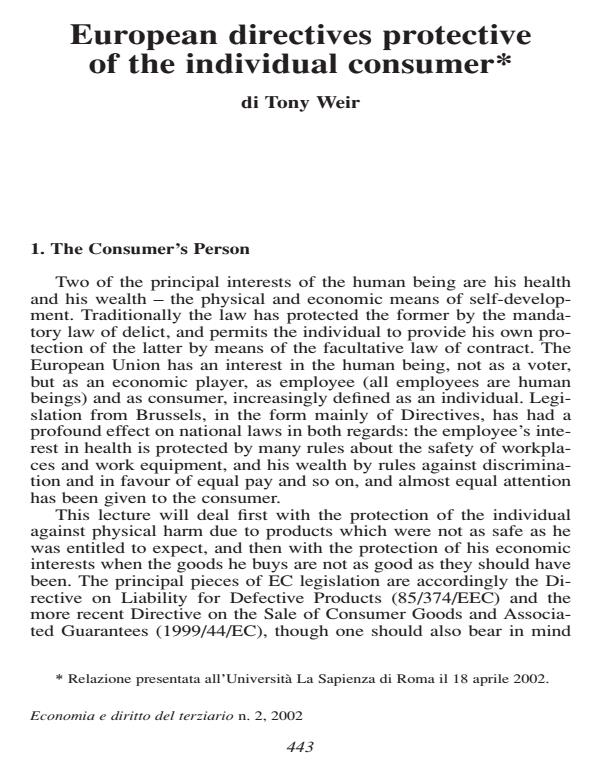European directives protective of the individual consumer
Journal title ECONOMIA E DIRITTO DEL TERZIARIO
Author/s Tony Weir
Publishing Year 2003 Issue 2002/2
Language English Pages 15 P. File size 66 KB
DOI
DOI is like a bar code for intellectual property: to have more infomation
click here
Below, you can see the article first page
If you want to buy this article in PDF format, you can do it, following the instructions to buy download credits

FrancoAngeli is member of Publishers International Linking Association, Inc (PILA), a not-for-profit association which run the CrossRef service enabling links to and from online scholarly content.
<i> European directives protective of the individual consumer </i> (di T. Weir) - ABSTRACT: Individual citizens of the Member States may have little effect on the copious legislation emanating from Brussels, but their rights against producers and suppliers of goods which are either actually dangerous or merely disappointing have been extended by several Directives. This article concentrates on two such measures and their impact on the pre-existing law in Germany, France and England: the Directive on Defective Products (85/374/EEC) and that on Sales of Consumer Goods (1999/44/EC), the former being concerned with physical harm to individuals and their property and so affecting the law of tort, while the latter aims to protect the consumer’s pocket and affects the law of contract. The constitutional basis of the Directives differs, with the effect that the former disallows, while the latter encourages, subsequent national legislation which improves the position of the individual victim or consumer. The principle of the Defective Products Directive, that the producer of defective goods be strictly liable, regardless of fault, for the harm they cause, unquestionably comes from the judge-made law of the United States, but whereas the law there has relaxed materially in the intervening years, the Directive is not subject to national amendment and even invalidates pre-existing legislation more favourable to the victim, as was recently discovered in Luxembourg by Spain as well as France, which was ten years late in implementing the Directive at all. But if, which is doubtful, the true purpose of the Directive was to remove the supposed distortion of the market, it has signally failed to do so, since it harmonises only the rules of liability without attending to the critical matter, namely the cost of liability to the producer, the essential question being not when the producer is liable but how much it has to pay. Were it not that it provided the reason, or the pretext, for the first radical amendment of the German Civil Code for over a century, one would say that the Directive on Consumer Sales is less dramatic, seeing that in terms of substance it merely reverses the burden of proof in favour of the consumer and gives him more time in which to complain. Unlike the other Directive, however, it deals with remedies, and in prioritising specific remedies (repair/replacement) over monetary claims (damages) it has caused more difficulty in England, with its reluctance to order specific performance of contractual obligations, than elsewhere. Its utility anywhere is very questionable, except in so far as it abolishes the few relics of the actio redhibitoria. .
Tony Weir, European directives protective of the individual consumer in "ECONOMIA E DIRITTO DEL TERZIARIO " 2/2002, pp , DOI: